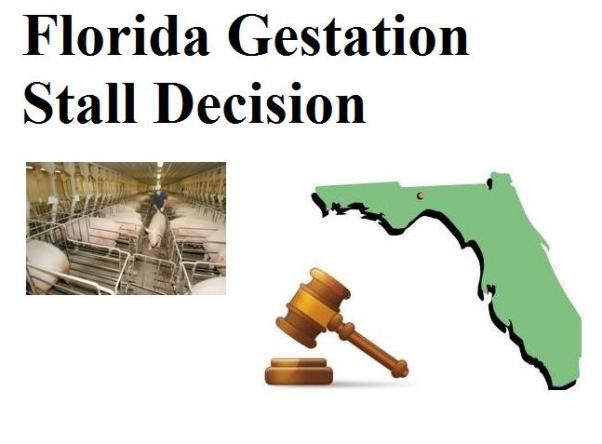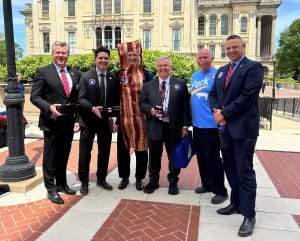Former Florida Hog Farmer Awarded $505,000 over Constitutional Amendment
July 31, 2013

Florida passed the first constitutional amendment in 2002, prohibited the housing of pregnant sows in gestation crates. And now, Florida is marking up another first, with an appellate court decision affirming a ruling that awarded a producer $505,000 plus interest for improvements to his property that were made useless by the amendment.
Plaintiff Stephen Basford was one of two Florida farmers who used gestation crates at the time the amendment was passed. A year later, according to the evidence offered at trial, he shut down his operation, “unable to afford an estimated $600,000 in costs needed to stop using gestation stalls; other buildings and equipment on his farm were also unable to be used due to the functionally integrated nature of his business.”
In 2010, Basford filed an “inverse condemnation" lawsuit. In the lawsuit, he did not seek compensation for any loss in value of the land itself, but instead for the loss of the improvements he had made (including a “breeding barn, a gestation barn where the gestation crates that were banned by the amendment were used, a farrowing barn with farrowing crates, two finishing barns, a feedmill and shelter equipped for storing and mixing feed, a lab/office with equipment for artificial insemination, four water wells with pumps to serve the barns and feedmill, clay lagoons for waste disposal, and a metal chute with hydraulic cylinders for lifting pigs into trailers for transport to market”).
Like what you’re reading? Subscribe to the National Hog Farmer Weekly Wrap Up newsletter and get the latest news delivered right to your inbox every week!
Last week, the First District Court of Appeal, in a 2-1 decision, upheld Jackson County Circuit Judge John Fishel’s ruling in Basford’s favor. That opinion said Basford's operation “depended on raising a high volume of pigs for market, and his improvements were designed for that purpose.”
Further, the court relied on the trial judge’s acceptance of “Basford’s “testimony that his barns could not be used for any purpose other than raising pigs and that the wells and feedmill had no other practical purpose or use. The state offered no evidence below to refute (Basford's) testimony on alternative uses of the improvements. Nor has it argued on appeal that the improvements had any other purpose or that Basford could have converted to another type of pig-raising operation.”
However, dissenting judge Phil Padovano argued that “Basford didn't deserve compensation because his hog farm consisted of just four acres on a 318-acre farm. ‘We are obligated to evaluate the plaintiff's claim based on the effect this new constitutional provision had on the entire parcel of land, not just one structure on the land, or several acres of the land,’ Padovano wrote.”
The award of $505,000 plus interest was calculated based on the inability to use the improvements after November 2008, when the 2002 amendment took effect. A spokeswoman for the state attorney said that they are reviewing the ruling.
To read the appellate court opinion, click here.
For questions or for more information on laws affecting farm animal confinement, contact University of Arkansas staff attorney Elizabeth Rumley at [email protected].
You might also like:
Porcine Epidemic Diarrhea (PED) Virus: FAQ and Survival Tips
You May Also Like


